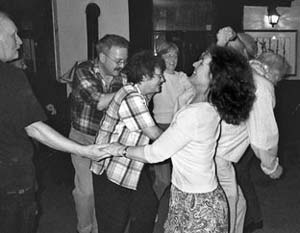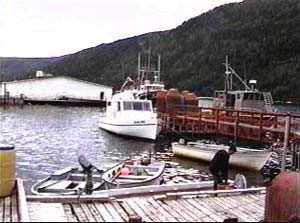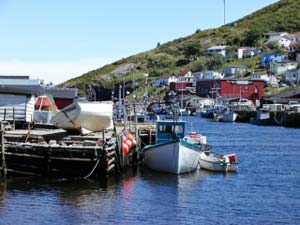Life After Cod
Air Date: Week of August 12, 2005

The vanished Newfoundland fishing community of Harbour Deep. Founded in the 17th century, its last residents left in 2002. (Photo: Fred Campbell)
A rare look from inside a community that has lost its longtime reason for being. Newfoundland producer Chris Brookes listens to what was lost and what has remained in two communities since the disastrous over-fishing of the region’s Atlantic cod.
Transcript
CURWOOD: It’s Living on Earth. I’m Steve Curwood. In 1992, catastrophe struck the once-gigantic Atlantic cod fishery off Newfoundland. Scientists and fishermen suddenly discovered that the Northern Cod had been fished to commercial extinction. A ban on catching cod was put in place, but it came too late. And the fishery has yet to recover. Chris Brookes is a Newfoundland journalist who's watched his fellow islanders grapple with the consequences. His report is part of "Worlds of Difference,” a documentary series on global cultural change.
[MUSIC AND DANCING SOUNDS]
MAN: I don’t know, some people say this is a metaphor for life. You know, life is a big elaborate dance. And it’s all about keeping your feet while the music changes. Because the music does change, right?
[DANCING STOPS]
BROOKES: Okay, this is a recording of the Fort Amherst foghorn. I make a lot of recordings. Like this one. This is the sound of fog, rolling in the harbor past my house. [FOGHORN] When I'm recording, it's the sound of the present. I put the tape on a shelf and when I play it back days or weeks or years later, of course, it’s become the sound of the past. [FOGHORN] A little spool of memory, measuring the gap between then and now. And I feel like there's something sad about the gap, but I don't know why. It’s just things changing.
[FOGHORN]
BROOKES: Of course, this isn't really the sound of fog; fog is something you can't hear on the radio. This is a foghorn: a thing that evolved entirely because of fog. So, it’s kind of like the voice of fog.
[WOMAN’S VOICE HUMMING]
BEST: Okay, how about that?
BROOKES: I made this recording of the singer Anita Best last summer.
BEST: Ready?
BROOKES: A navigational song.
BEST: [SINGING] From Boniface (sp) Cape to the stinkin’ isles, The course is north for 40 miles, When you must steer away northeast till Cape Freeculls (sp) Island bears nor’ norwest. Then nor’ norwest 33 miles, three leagues offshore lies Whattums (sp) Isles, where all the rock you must take there, two miles south scuddies from miles it bears…
BEST: Sometimes songs were used as navigational aids for people who couldn’t really read charts and maps. And you wanted to be able to make the right turns to get around the reefs and rocks and stuff, you know.
BROOKES: So, it’s kind of a sung map?
BEST: Yeah. Oh yeah, absolutely. Yeah, in a symbolic kind of way, yes, we used to sing our way around the world. Like the Australians have the song lines. It’s an interesting idea to find your way around in the world by song.
[SINGING] Therefore, my friend, I would you advise, since with all those rocks and danger lies, that you may never amongst them fall, but keep your love and weather them all.
[SINGING FADES UNDER]
BROOKES: A friend of mine likes to point out that Newfoundland is the oldest non-aboriginal culture in the Americas. Before the Plains Indian had the horse we were here, singing the fishing grounds. Like the foghorn with the fog, we evolved entirely because of the fish, and for five centuries we sang, we danced, we spoke the language of fish. Our culture was their voice. Then, suddenly, the fish were gone.
It was 12 years ago. The tapes on my shelf sound like this.
NEWS MUSIC, NEWSCASTER: In the news tonight, net loss. Atlantic ground fish stocks nose dive amidst warnings of economic disaster in the maritime fishery…[FADES TO MALE VOICE]: It’s a major and social economic catastrophe. It’s the best way of saying it. [FADES]
SAM: There’s always hope. Not much of it. But my mind frame now is telling me that the fish is not gone, it’s moved somewhere. Right? And in time it’ll come back to us. It’s just, you can’t even imagine never having a cod again.
BROOKES: Twelve years later people can imagine it. The cod fishery is still closed, taking 30,000 jobs with it. Lots of people have left--there were 12,000 a year leaving the island at one point. And some fishing communities have died
[HORN]
BROOKES: This is one of them. A place called Harbour Deep. I took my tape recorder there four years ago when it was still alive.
MAN: I remember seven miles….
BROOKES: It was a three-hour ferry ride to get there. No road.
[CAPTAIN ‘BE THERE IN 40 MINUTES…]
BROOKES: The community itself. It was Sunday.
[CHURCH SINGING]
BROOKES: A decade earlier the little church would have been full. But listen to this recording and you’ll hear just ten voices. [SINGING: We will rejoice…] And outside of the church no one was rejoicing. They were talking about leaving.
WOMAN: We’re just packing now, getting ready to go.
BROOKES: Where are you going?
WOMAN: On the ferry tomorrow, going to New Brunswick.
BROOKES: You been here all your life?
WOMAN: Yes, yeah, I’ve been here all my life.
BROOKES: Has it changed a lot in the last few years?
WOMAN: Yes. Yeah. I mean, people are moving out too now, you know, it makes a lot of difference to the place. There’s no in-shore fishery like there used to be. Years ago, you know, everyone would be fishing here, that made a lot of difference. Now, that’s all gone. And there’s not many people around. And that makes it look lonely.
Would you like to have a cup of tea? You said you’d like to have a cup of tea. I’ll give you a cup, too.
BROOKES: Thank you.

The Harbour Deep dance "Running the Goat" (Rick West)
BROOKES: The fish didn't come back, and the people left. A year after I visited, the isolated fishing community vanished from the map. But it lives on as a dance. A dance that for centuries was done nowhere else but in Harbour Deep. A pattern of steps called Running the Goat.
[DANCING SOUNDS, MUSIC]
BROOKES: Let me put that tape back on the shelf for a minute. [CHANGES CASSETTE TAPE] And play you… this one.
[DOOR OPENING]
MALE: The museum.
BROOKES: This fishing community is still here. So far. Petty Harbour.
HARRIS: And this is the picture that was donated to me a little while ago.
BROOKES: Petty Harbour, 1898. As it was then. The only place you'll find a commercial cod fishery here today is in the town museum. Petty Harbour is near Newfoundland’s capital of St. John's - and the proximity to the city gives it a fighting chance for survival. Its little museum isn't that unusual - but the office just down the hall is. The sign on the door says "Petty Harbour Development Corporation."
HAMLIN: My name is Jim Hamlin. And I’m on the Petty Harbour Manage Co. Development Corp.
HUTCHINGS: My name is Nat Hutchings, I’m the mayor of the community.
|
HAMLIN: I think there’s been a great psychological change. For many people, their lives were totally changed - who they were, their productivity. Your identity is tied to what you can produce. And how you see yourself being productive. And others see you being productive. You know, you take that away, it’s a big change. HUTCHINGS: It’s more like a culture shock. I mean your culture all your lifetime is the fishery, the fishery. I mean, you eat and you live and you’re breathing the fishery. And all of a sudden, I mean, that’s gone. It’s like a death, it’s so total, and there’s no getting that part back, so after a while, you gotta do something. I believe that’s what the community done. Ninety-nine percent of the community said, I can’t live like this, I got to go on with my life. Our community got to be sustainable. The people in the community said listen, I’m going to do something. I’m not gonna fail. HAMLIN: The consensus was that people saw that tourism could be a way in which to create new employment, create new business opportunities. And help make the bridge to what, I guess, has become the new economy for us. [CRAFT SHOP NOISES, WOMAN TALKING] BROOKES: The new economy at work. This used to be Weir's General Store in Petty Harbour, selling groceries and canned goods to residents. Now it’s the Old Craft Store, offering crafts and souvenirs to tourists. WOMAN: It’s still an old-fashioned shop…. BROOKES: If the town development corporation has its way, shops like this are just the beginning. Their four-year Strategic Tourism Plan predicts that if they can raise the funds and build infrastructure, the average visitor would drop 25 dollars per visit on food, souvenirs and attractions. That could generate three million dollars a year and 150 jobs. [PAPER RUSTLING] BROOKES: This is the architects’ plan here, is it? MAN: Yes, it’s basically a four-year plan, putting in place basically the infrastructure—you know, interactive history, museum, restaurant--that you need in order to attract people, keep people here. To have people spend their money in our communities. BROOKES: It’s a tourism industry that you’re basing on the identity… MAN: What we have now. Basically. Just adding say some infrastructure MAN: Amenities, right? People want, you know, to see what you have, but they’re consumers too. MAN: Our philosophy is a change in that we’ve looked for new ways in order to maintain our communities. And one of the new things is the tourism industry. KIERLY: Okay, here’s how it’s gonna go…. BROOKES: Ironically while the live community of Petty Harbour tools up a four-year plan to catch tourists, the dead community's dance doppelganger is already reeling them in. Not, of course, in Harbour Deep, the community's gone, but in tourist entertainments elsewhere around the island. This one is held in Trinity Bay, and every Wednesday night from June to September Running the Goat dance is a big hit with tourists. Tonya Kierley calls the dance. [FIDDLE MUSIC]  The vanished Newfoundland fishing community of Harbour Deep. Founded in the 17th century, its last residents left in 2002. (Fred Campbell) |
KIERLEY: Harbour Deep is part of that race of communities that’s gone. And what have we got to show? Oh, we got their dance. You know, we have the essence of Harbour Deep in a dance, in a little vial, that I can take out every Wednesday night and open it go look, poof, look here’s some pixie dust from Harbour Deep. And now for a moment – for 25 minutes, we’re all going to be people from Harbour Deep, Running the Goat. It’s disgusting in a way, but completely inevitable and natural and good in another. For visitors and for locals alike, to be able to dance in a choreographed piece of authentic – it’s a very loaded word there – authentic Newfoundland dance and music is the experience they’re looking for. It is the shoehorn into the cultural experience. I can’t tell you how many people leave the dance hall and say, “You’ve made my stay.” BROOKES: Teaching a dance like that to tourists, it’s obviously different than a community, which used to do it as its own dance. KIERLEY: Mmm-hmm. I stopped doing the dance for a long time, actually. Because I wasn’t sure the ends justified the means. Academically, my training is as a folklorist. And the longer that I operated in the tourism industry as a folklorist the more I began to realize that tourism is eclipsing culture and swallowing it up whole. And what they’re spitting out is enough to make your gall rise. [CHEERING IN DANCE HALL] MAN: You know, it’s all about being able to adapt. BROOKES: What do you say to the critics who say well, Newfoundland communities refocusing toward tourism is going to turn the place into a kind of a folksy Disneyland? MAN: Well, there are skeptics. But the thing about it too is do you just throw your hands up and say, is that the end of us as a people? Have we been here five hundred years for that? MAN: There’s another way of looking at it. We had fish one time. We had employment. We got tourists now. We’re fishers of people basically now, rather than fishers of cod. [FOGHORN] BROOKES: So, there'll be a Petty Harbour small boat museum and a Petty Harbour fishery interpretation center and, with luck, the community will thrive. Thanks to heritage tourism that's not unlike the audio tapes sitting on my shelf: spools of memory measuring the gap between how things used to be and how things are now. Between an economy based on the greatest fishery in the world, blindly destroyed a decade ago and one based on the memory of it. A memory recorded, and played back, for others. [FOGHORN] BROOKES: For Living on Earth, I'm Chris Brookes in Newfoundland. [All music original live recordings from producer/reporter Chris Brooks] CURWOOD: Our story on Newfoundland and the collapse of cod is part of the series “Worlds of Difference,” a project of Homelands Productions - and made possible with funds from the Corporation for Public Broadcasting. For photos from Newfoundland, see our website – Living on Earth dot org. Links
|






